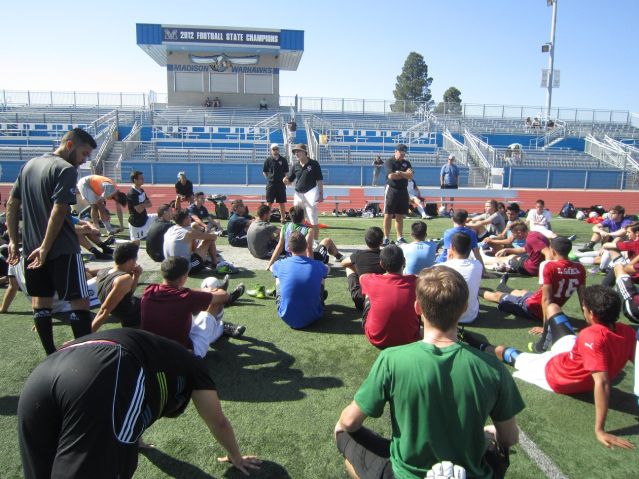Stress
Making the Team: Helpful Hints for Your Next Sports Tryout
A Personal Perspective: Sports team auditions are as pleasant as taxes.
Posted March 12, 2023 Reviewed by Jessica Schrader
Key points
- Tryouts are a stressful process for athletes of all ages and skill levels.
- Anxiety, nervousness, and other unwanted emotions and thoughts are a normal part of the tryout experience. Be ready and willing to have them.
- Control the controllable—your actions, concentration, and effort—and let go of the rest.

Tryouts: a bane and rite of passage for athletes of all ages and skill levels.
From a child’s first effort to make a soccer team to the freshman striving for a high school roster spot, to the aging professional desperately hanging on to their career, tryouts can be a stress-inducing nightmare.
“I’ll disappoint my family if I don’t make it.” “I’ll never make it.” “Why are the coaches staring at me?” “I messed up, @#&/?!” “If I get cut, my career is over.” These are just a few of the thoughts playing havoc with the minds of athletes young and old.
Here are a few suggestions for athletes and their supporters to successfully navigate the tryout ordeal.
Expect and Be Ready for Anxiety
It’s perfectly normal to be anxious or nervous at a tryout, but that doesn’t mean you can’t perform. Focus on executing the skills required for your sport, not the stress-inducing thoughts and feelings that show up. Be willing to have those unwanted thoughts and emotions and your body will be able to do what it has diligently trained for.
What would happen while riding a bicycle if you focused on the thoughts and feelings about all the terrible things that could occur on the bike? You’d crash, and that’s exactly what will happen during tryouts if you are focused on distracting, distressing thinking and emotions.
We do not control thoughts and emotions. They randomly show up like that annoying neighbor, office worker, or kid from school. They are there, but we don’t have to let them distract us. Focusing on thoughts and feelings, or trying to make them go away, only intensifies them.
Concentrate, instead, on your job and the skills required for successful performance. Get out of your head and get into the game.
“Control the Controllable”
That is from elite athletes. Here’s what it means. Take charge of your actions, concentration, and effort (A.C.E.). All else is out of your control and will distract you.
One common uncontrollable that athletes often get snagged on is comparing themselves with other athletes. “Comparison is the thief of joy,” observed Theodore Roosevelt, the 26th president of the United States. It’s also the thief of concentration and a successful tryout.
Focusing on the other athletes trying out is pointless. Getting caught up in how you are bigger, smaller, faster, slower, stronger, or weaker, or thinking you are doing better or worse than them, achieves nothing but a mental distraction.

“I always relate myself to a golfer,” explained veteran NFL punter Britton Colquitt during an interview I conducted with him at the 2019 Cleveland Browns training camp. “Those guys (golfers) don’t go into a tournament trying to beat the person they’re playing against. They try to put up their best score and hope that it’s better than their competitors.”
Colquitt, currently an unsigned free agent, was competing for the Browns’ punting position with rookie Jamie Gillan. Colquitt eventually lost that battle, ending up with the Minnesota Vikings from 2019 through 2020. He’s a 12-year NFL veteran with two appearances in the Super Bowl. He knows a little something about life in the NFL and the stress and storm of tryouts.
Another tryout uncontrollable is the coach. Getting fixated on what those tryout evaluators are doing, thinking, etc., is a total distraction. Many young athletes look at the coaches after every little thing that happens. That behavior is one of the worst mistakes to be made at a tryout. The last thing coaches want is a distracted worrier.
A common young athlete distraction is their parents. Some kids constantly gaze at mom or dad—another bad look. Coaches are leery of over-involved parents and their overly dependent kids. Athletes needing to know every mom and dad's reaction is a telltale sign of a distracting helicopter parent.
A few suggestions for parents: Please drop off your child and leave. If you must stay, don’t hover. Find a distant spot out of your child’s eyesight.
Also, you don’t need to ask if they need a Gatorade. They are perfectly capable of caring for their own refreshments, equipment, and bathroom needs. It’s a huge tryout plus when kids demonstrate independence from mom and dad.
Let kids fend for themselves. It's their tryout, not mom or dad’s.
The Past—Another Uncontrollable
The most important play in sport is the next one. Whatever happened before is over. Athletes—young and old—can get distracted by past events, over-celebrating the good, hanging their heads, or throwing a temper tantrum after a miscue. All reactions can lead to a failed tryout. Get over it.
Coaches want to see athletes make mistakes to see how they respond. Will you bounce back quickly and focus on the next play or dwell on your screw-up? Nobody expects you to feel good after an error, but it’s not an excuse for distracted, bad reactions.
Turn a bad thing into a good thing by refocusing from whatever just happened to the next thing. Slow down, breathe, chill, and move on. Coaches will love you for it.
Keep Things in Perspective
“Young athletes take sports way too seriously,” Colquitt observed. “When they do, they put way too much pressure on themselves.” He was talking about professional athletes early in their careers as well as younger amateurs.
“I’m a parent, I’m married and have a wife and four kids,” Colquitt continued. “That puts things into perspective and takes the pressure off. Football is my career, so it’s important, but when you get older you realize there are far more important things than sports. Family, health, and so many other things are so much more important than sports. Training camp is stressful for sure. Your career is at stake, but keeping a healthy perspective takes a lot of pressure off.”
Today’s culture has turned sports into a life-and-death endeavor for young people. Is it any wonder given how coaches, parents, and other involved adults have turned athletics into a stress-inducing, year-round, never-ending commitment?
No, the fate of Western civilization does not hinge on whether little Susie or Johnny makes the travel baseball team, whether Benji lands on the high school hockey team, or if Renee gets a D1 college. scholarship.
Keep sport in its proper perspective, as Colquitt suggests, and take the pressure off tryouts and other sports scenarios. There are things of more importance and gravity than a tryout. Just ask a wounded warrior, the family of a hospitalized child, or a Ukrainian refugee.
Tryout Reminders
Be ready for anxiety, nervousness, frustration, anger, and other unwanted emotions and the accompanying mind chatter. They will show up, so be prepared and willing to have them. Focus on the task at hand, not on your unwanted thoughts or feelings.
Control the controllable—you. Focus on what you are doing, not on the other athletes, coaches, parents, etc. Also, keep a short memory. Whatever happened is over. Move on to the next task.
Relieve the pressure by keeping things in their proper perspective. Sports are not an end-all, be-all thing. Life goes on whether tryouts turn out the way you want or not.
Good luck with tryouts.




